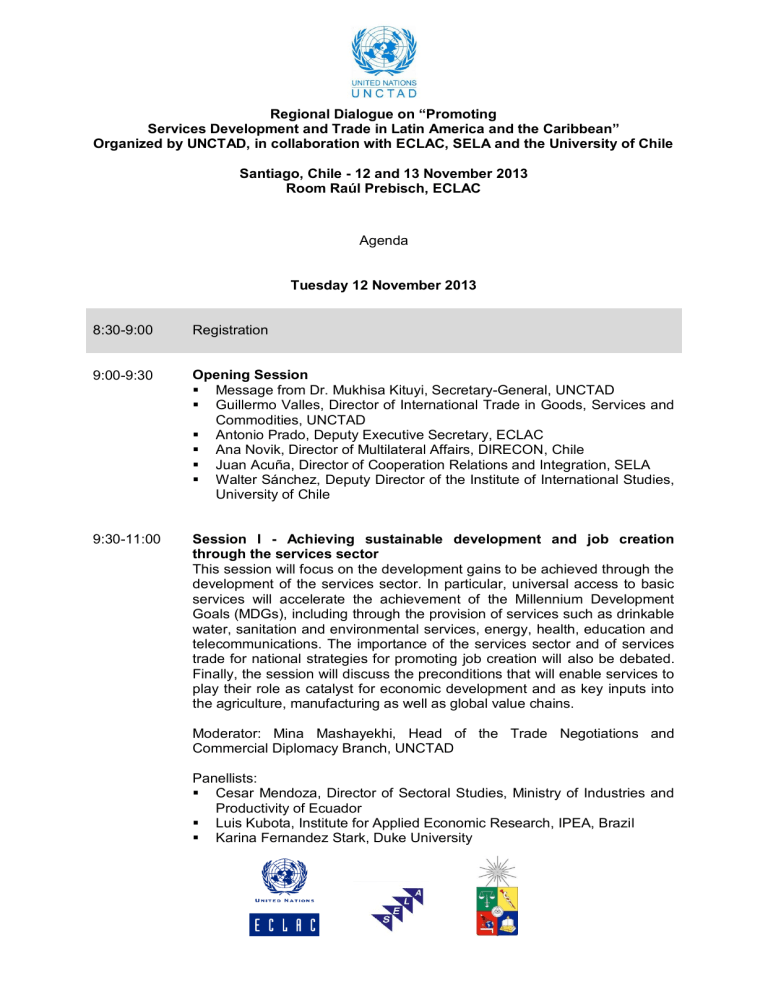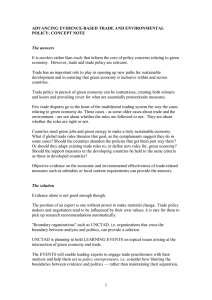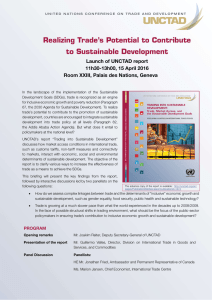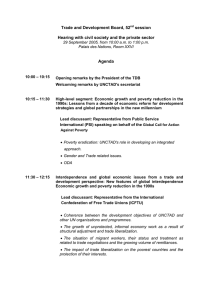Regional Dialogue on “Promoting

Regional Dialogue on “Promoting
Services Development and Trade in Latin America and the Caribbean”
Organized by UNCTAD, in collaboration with ECLAC, SELA and the University of Chile
Santiago, Chile - 12 and 13 November 2013
Room Raúl Prebisch, ECLAC
Agenda
Tuesday 12 November 2013
8:30-9:00
9:00-9:30
9:30-11:00
Registration
Opening Session
Message from Dr. Mukhisa Kituyi, Secretary-General, UNCTAD
Guillermo Valles, Director of International Trade in Goods, Services and
Commodities, UNCTAD
Antonio Prado, Deputy Executive Secretary, ECLAC
Ana Novik, Director of Multilateral Affairs, DIRECON, Chile
Juan Acuña, Director of Cooperation Relations and Integration, SELA
Walter Sánchez, Deputy Director of the Institute of International Studies,
University of Chile
Session I - Achieving sustainable development and job creation through the services sector
This session will focus on the development gains to be achieved through the development of the services sector. In particular, universal access to basic services will accelerate the achievement of the Millennium Development
Goals (MDGs), including through the provision of services such as drinkable water, sanitation and environmental services, energy, health, education and telecommunications. The importance of the services sector and of services trade for national strategies for promoting job creation will also be debated.
Finally, the session will discuss the preconditions that will enable services to play their role as catalyst for economic development and as key inputs into the agriculture, manufacturing as well as global value chains.
Moderator: Mina Mashayekhi, Head of the Trade Negotiations and
Commercial Diplomacy Branch, UNCTAD
Panellists:
Cesar Mendoza, Director of Sectoral Studies, Ministry of Industries and
Productivity of Ecuador
Luis Kubota, Institute for Applied Economic Research, IPEA, Brazil
Karina Fernandez Stark, Duke University
11:00-11:30
11:30-13:30
13:30-14:30
Francisco Monge, Deputy Director General of Foreign Trade, Ministry of
Foreign Trade of Costa Rica (videoconference)
Questions for discussion:
How has the services sector contributed to job creation, poverty reduction and increased welfare in LAC over the past two decades?
Is the role of services as inputs into agriculture and manufacturing increasing?
What are the preconditions that enable services to accelerate economic development?
What are the policy trends that can enable services to play a role as a catalyst for economic growth?
How can countries leverage development gains through increased participation in services global value chains?
Coffee break
Session II - Designing strategies for services sector development at the national level
This session will present the main findings and recommendations of the
Nicaragua and Peru Services Policy Reviews (SPRs) and of the Jamaica
Trade Policy Framework. Through these experiences, the session will discuss about the identification of strategies to develop the sector and take advantage of services trade opportunities, including through the establishment of coherent and integrated policy, regulatory and institutional frameworks.
Moderator: Mina Mashayekhi, Head of the Trade Negotiations and
Commercial Diplomacy Branch, UNCTAD
Panellists:
Jose Antonio de la Puente, lead consultant of the Peru SPR
Silvia Seperack, Trade Counsellor of Peru in Chile
Asha Bobb-Semple, Programme Coordinator, Jamaica Coalition of
Service Industries
Javier Bone, lead consultant of the Nicaragua SPR
Luisa Rodriguez, Trade Negotiations and Commercial Diplomacy
Branch, UNCTAD
Questions for discussion:
What are the main challenges faced by Peru, Nicaragua and Jamaica with respect to policy, regulatory, and institutional environments for services sector development?
Are there national strategies to coordinate trade policies with regulatory reforms and other policy objectives?
How can services (trade) contribute more attaining the MDGs?
What can we learn from the SPRs in term of how to manage the interface between trade policy, sector policy and development and economic policies?
Lunch
14:30-16:00 Session III - Tackling the challenges of policy formulation and implementation
This session will focus on the process of turning countries’ trade and development policies relating to the services sector into practice. It will discuss the multiple obstacles for policy implementation, including mismatch between blueprint policies and a country’s context, and limited human, institutional and financial resources. Suggestions will be made on how countries can overcome these obstacles.
Moderator: Nanno Mulder, International Trade and Integration Division,
ECLAC
Panellists:
Margarita Peña, Director of the Services Division, Ministry of Trade of
Paraguay
Gabriela Pantoja, Secretariat of Commerce and Services, Ministry of
Development, Industry and Foreign Trade of Brazil
Katina Perez-Estrada, Division of Economic International Organizations of the Ministry of Trade and Investment of Cuba
Nicolas Lozada Pimiento, Directorate of Foreign Investment, Services and Intellectual Property, Ministry of Trade of Colombia
Questions for discussion:
What are the underlying causes for success and failure in services development policies?
How have countries overcome resource constraints to successfully implement policies in the services sector and build competitive services
16:00-16:30
16:30-17:30 sectors?
What are the key factors and tools essential to ensuring the success and sustainability of policy implementation in the services sector?
Are there any specificities of policy implementation for the services sector vis a vis other sectors?
Coffee break
Session IV - Enhancing stakeholders involvement in services policy making and negotiations
This session will take stock of the extent to which stakeholders are successfully involved in policy-making and preparations for trade negotiations relating to services. Participants will discuss examples of successful collaborations but also shortcomings and suggest innovative ways to strengthen the role of multi-stakeholder consultations in servicesrelated policy formulation, implementation and review.
Moderator: Guillermo Valles, Director of International Trade in Goods,
Services and Commodities, UNCTAD
Panellists:
Marjorie Straw, Manager of Special Projects at JAMPRO and Chair of the Caribbean Network of Service Coalitions
Yeseila Baca, Ministry of Industry, Development and Trade of Nicaragua
Professor Eduardo Raupp, University of Brasilia
Questions for discussion:
Are stakeholders sufficiently involved in services policy-making and
services trade negotiations?
What are the differences between their involvement in policy-making and in negotiations?
What tools can be used to promote trust and cooperation among the various actors involved?
Are there successful/innovative initiatives that could be replicated?
Wednesday 13 November 2013
9:00-11:00 Session V - The landscape of services trade and cooperation initiatives for increased trade in LAC
This session will analyze data and salient features regarding flows in extra- and intra-LAC services trade. It will also discuss the liberalization of services within multilateral negotiations (i.e. Doha and post-Bali negotiations) and regional integration initiatives, as well as cooperation and harmonization frameworks for services in LAC. Particular attention will be devoted to the importance of specific modes of supply in services trade flows and to the trend towards comprehensive trade agreements.
Moderator: José Duran, International Trade and Integration Division, ECLAC
Panellists:
Marcel Vaillant, Professor, Department of Economics, University of the
Republic, Uruguay
Nanno Mulder, ECLAC
Timothy Odle, Deputy Programme Manager of Services, Caribbean
Community Secretariat, CARICOM
William Garcia, Director of Economic Integration, Secretariat for Central
American Economic Integration, SIECA
Questions for discussion:
What is the progress of the GATS negotiations? How can post-Bali negotiations outcomes reflect the interests of developing countries?
What are developments in other trade initiatives including TISA, TPP and
TTIP, etc?
How do intra-LAC services trade barriers faced by services exporters
11:00-11:30 differ from extra regional barriers?
What is the trade impact of current cooperation initiatives and harmonizing frameworks in services within LAC?
How can LAC countries exploit services trade opportunities through the various modes of supply?
What are the possible impacts of on-going negotiations of comprehensive trade agreements for LAC?
Coffee break
11.30- 13:30 Session VI - A regional agenda for services development and services trade
This session will present different views on the development of services and services trade in LAC. The specific needs of the continent, particularly in terms of supply-side capacity, will be outlined. In addition, suggestions on how to promote services supply and export capacities will be discussed, with an emphasis on possible trade and cooperative regional efforts to address the needs identified.
13:30-14:30
14:30-16:00
Moderator: Juan Acuña, Director of Cooperation Relations and Integration,
SELA
Panellists:
Carlos Aldeco, Chief of Trade Agreements and Negotiations, ALADI
Melinda St Louis, Public Citizen
Javier Peña, General Secretary of the Latin American Services Export
Association, ALES
Joaquin Piña, Chamber of Commerce of Santiago
Juan Acuña, Director of Cooperation Relations and Integration, SELA
Questions for discussion:
What are the regional services development challenges and opportunities?
Is there a regional vision on how to promote intra-LAC services trade?
Are the regional trade and cooperation initiatives adequately accounting for services issues? Are these coherent with multilateral initiatives?
What is the role for (sub)regional institutions in promoting the sector development of services and services trade?
How could UNCTAD Global Services Forum contribute to raise awareness about services policy issues in Latin America?
Lunch
Session VII - Partnerships to develop services supply and export capacity
This session will discuss partnerships to develop services supply and export capacity (i) among different stakeholders at the national level and (ii) between domestic constituencies and development cooperation partners.
Suggestions will be made on mechanisms to ensure successful partnerships and to maximize the benefits of cooperation and support provided.
Moderator: Dorotea Lopez, University of Chile
Panellists:
Pablo Garcia, Integration and Trade Lead Economist, Interamerican
Development Bank, IADB
David Gomez, Caribbean Export Development Agency
Rainer Engels, Executive Manager, EPA Implementation Support
Project, GIZ, c/o Caribbean Export
Ricardo Sanchez, Senior Economic Affairs Officer, Natural Resources and Infrastructure Division and Chief, Infrastructure Services Unit,
ECLAC
Jesús Giacoman, Deputy Director General for Economic Affairs of the
Mesoamerica Project in the Ministry of Foreign Affairs of Mexico
Questions for discussion:
How can domestic partnerships promote services supply and export capacity?
What are the pre-conditions for external partnerships to successfully promote services supply and export capacity?
Is donor/development partner support to services sectors considered to address needs adequately?
Are domestic networks needed to coordinate services trade-related
16:00-16:30
16:30-17:30 technical assistance?
Is coordination among donors necessary and feasible?
Coffee break
Session VIII - Round Table Discussion on emerging challenges for service sector development and trade in Latin America and Caribbean
Moderated by Guillermo Valles, Director of International Trade in Goods,
Services and Commodities, UNCTAD
Osvaldo Rosales, Director of the International Trade and Integration
Division, ECLAC
Mina Mashayekhi, Head of the Trade Negotiations and Commercial
Diplomacy Branch, UNCTAD
Juan Acuña, Director of Cooperation Relations and Integration, SELA
Dorotea Lopez, University of Chile
Representatives of Government, academia, private sector and civil society
Based on discussions held in previous sessions, this roundtable will exchange views on emerging challenges for the regional development of the services sector. It should produce recommendations for research and capacity building activities to promote services sector development and services trade-led growth. It will discuss also ways to increase attention to developing integrated and coherent policy frameworks for services, including through SPRs.
Closing remarks by UNCTAD 17:30



